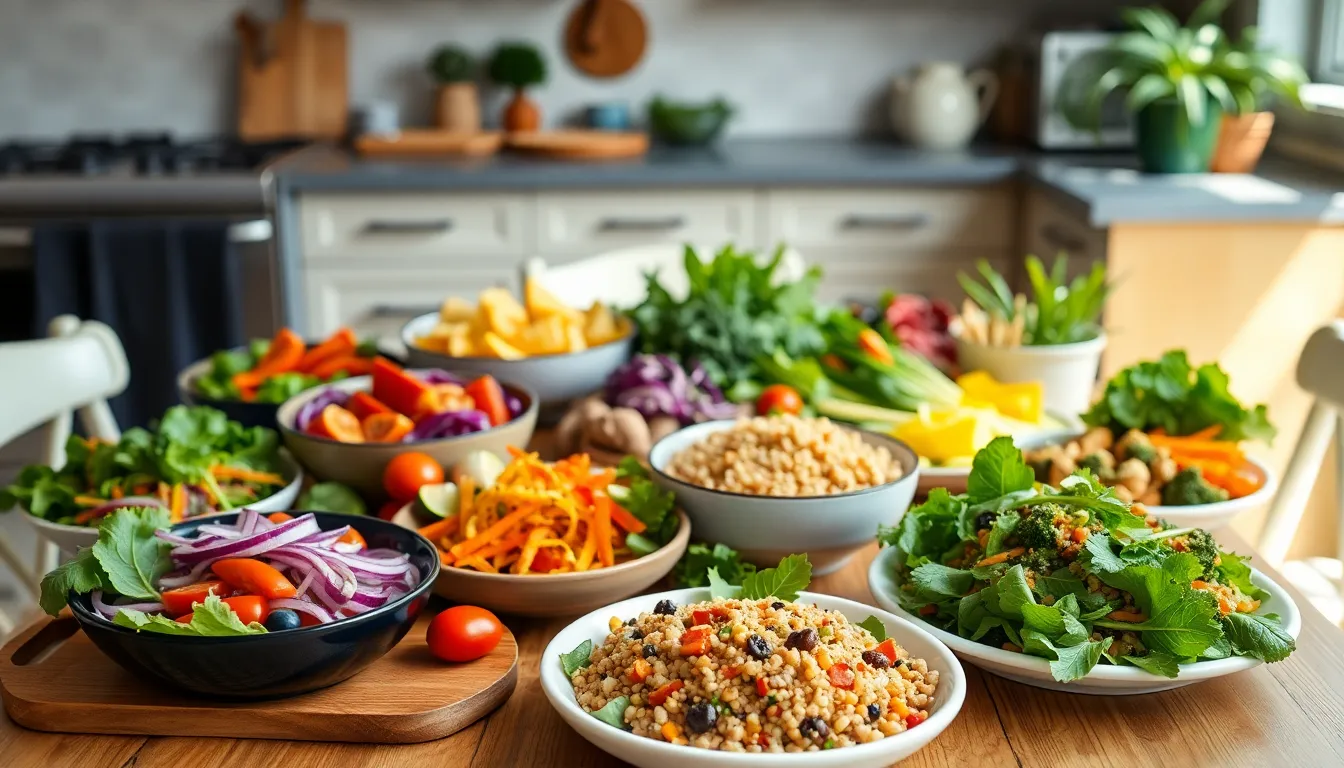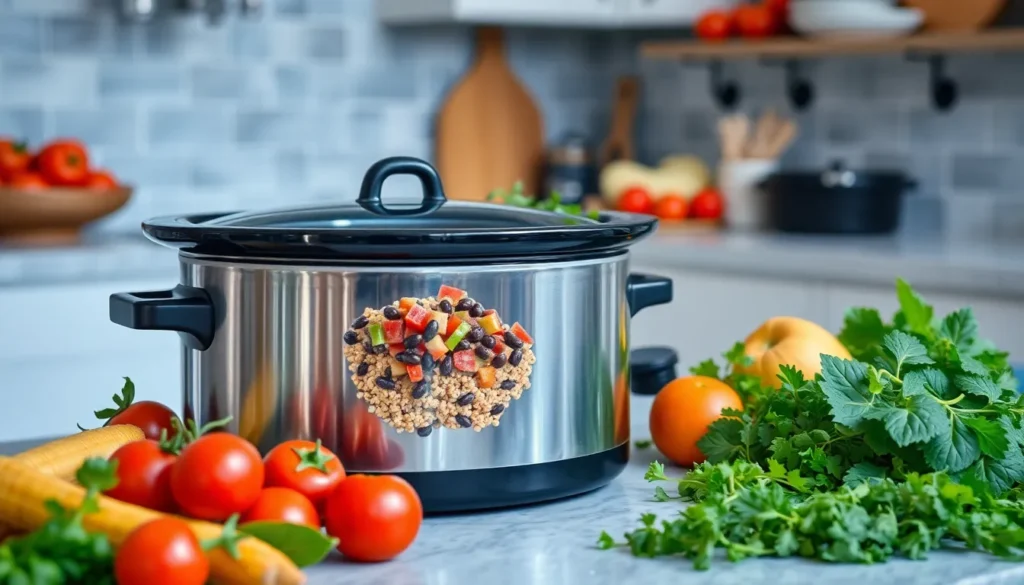In a world where kale reigns supreme and quinoa has become the new black, embracing vegetarian recipes isn’t just a trend—it’s a delicious revolution. Picture this: vibrant plates bursting with color, flavors dancing on your palate, and the bonus of feeling lighter than a feather. Who knew eating your veggies could be this much fun?
Vegetarian Recipes Healthy
Vegetarian recipes focus on using plant-based ingredients to create delicious meals. These recipes often include a variety of vegetables, legumes, grains, and fruits. Each recipe showcases unique flavors and nutritional benefits, making them suitable for all dietary preferences.
Colorful salads present an easy way to enjoy fresh produce. Ingredients like kale, spinach, bell peppers, and avocados offer a mix of textures and tastes, while dressings enhance their appeal. Many popular dishes incorporate grains as a base, such as quinoa or brown rice, providing essential protein and fiber.
Soups and stews highlight the versatility of vegetables. Ingredients like tomatoes, carrots, and beans combine to create hearty meals full of flavor. Vegetarian options often utilize spices and herbs to elevate taste, making them appealing and satisfying.
Snacks play a crucial role in vegetarian diets. Options like hummus paired with vegetable sticks, or roasted chickpeas, offer healthy alternatives to traditional snacks. Smoothies blending fruits with leafy greens provide a nutritious option for a quick breakfast or afternoon boost.
For main courses, dishes like vegetable stir-fries or pasta primavera bring together seasonal produce and whole grains. Cooking methods such as roasting or grilling can enhance flavors, ensuring that meals remain enjoyable. Also, casseroles featuring beans and vegetables deliver comfort and nourishment in one dish.
The global cuisine influences vegetarian recipes, drawing inspiration from various cultures. Mexican, Indian, and Mediterranean cuisines present countless ways to incorporate vegetarian ingredients. Each region showcases its techniques and flavors, enriching the vegetarian culinary landscape.
Benefits of Healthy Vegetarian Recipes

Healthy vegetarian recipes offer numerous advantages that enhance overall well-being. These dishes not only provide delicious flavors but also promote an array of health benefits.
Nutritional Advantages
Vegetarian recipes often boast high levels of antioxidants, vitamins, and minerals. Consuming plant-based foods such as fruits, vegetables, legumes, and whole grains supports heart health and reduces the risk of chronic diseases. Research shows that a well-planned vegetarian diet can contribute to weight management and improved digestion. Dietary fiber found in vegetables and legumes aids gut health and lowers cholesterol levels. These meals offer adequate protein from sources like beans or lentils, ensuring balanced nutrition. Adopting a vegetarian diet also encourages creativity in cooking, leading to diverse meal options rich in nutrients.
Environmental Impact
Choosing vegetarian recipes significantly reduces one’s carbon footprint. Plant-based diets require less water and land compared to meat-centric diets. According to studies, livestock production generates substantial greenhouse gas emissions. By embracing vegetarian meals, individuals contribute to reduced deforestation and habitat destruction. Sustainable food choices like vegetables and grains help support biodiversity and safeguard ecosystems. Opting for these recipes decreases dependency on fossil fuels and promotes environmentally friendly farming practices. Emphasizing local produce further enhances the positive impact on the environment, fostering a more sustainable food system.
Popular Ingredients in Vegetarian Cooking
Vegetarian cooking thrives on a rich variety of ingredients. Utilizing fresh and vibrant produce enhances flavor and nutrition in each dish.
Vegetables and Fruits
Leafy greens like kale and spinach provide essential vitamins and minerals. Bell peppers and tomatoes add color and antioxidants, elevating meals visually and nutritionally. Root vegetables such as carrots and beets contribute sweetness and heartiness. Seasonal fruits, including berries and avocados, enhance dishes with natural sweetness and healthy fats. Incorporating diverse vegetables and fruits not only creates a satisfying meal but also increases the overall health benefits.
Grains and Legumes
Whole grains such as quinoa and brown rice offer fiber and protein, making them ideal bases for many vegetarian dishes. Legumes like lentils and chickpeas provide essential protein and iron. Black beans contribute a robust flavor profile to salads and burritos, while peas add a pop of color and sweetness. Combining grains and legumes creates balanced meals that satisfy hunger and provide sustained energy throughout the day.
Herbs and Spices
Fresh herbs such as basil and cilantro bring brightness to vegetarian dishes. Spices like cumin and paprika add warmth and complexity, enhancing flavors significantly. Garlic and ginger contribute aromatic qualities and health benefits, while turmeric offers anti-inflammatory properties. Experimenting with a variety of herbs and spices elevates vegetarian cooking, turning simple ingredients into extraordinary dishes.
Easy and Quick Vegetarian Recipes
Delicious vegetarian meals can be prepared in no time. Each recipe emphasizes simplicity and accessibility while maximizing flavors.
Breakfast Ideas
Start the day with a vibrant smoothie bowl, featuring blended bananas and spinach topped with nuts and seeds. Oatmeal stands out as another excellent choice, enriched with almond milk and fresh berries. Avocado toast, layered on whole grain bread with cherry tomatoes and a sprinkle of salt, offers a satisfying option. For a quick bite, try yogurt parfaits, combining Greek yogurt with granola and fresh fruit. Each dish delivers essential nutrients, ensuring a healthy start.
Lunch Options
A quinoa salad combines black beans, corn, and diced peppers for a nutritious option. Wraps made with hummus and assorted veggies provide both flavor and convenience. Lentil soup, rich in fiber and protein, warms up perfectly for a filling meal. Chickpea salads, tossed with cucumbers and feta, offer bright, refreshing taste profiles. Each option feels uplifting, ideal for an energizing midday boost.
Dinner Favorites
Stuffed bell peppers filled with rice, vegetables, and spices create a colorful main course. Vegetable stir-fry showcases seasonal produce, sautéed with garlic and ginger for added depth. Zucchini noodles combined with homemade marinara sauce provide a low-carb alternative to pasta. Cauliflower curry, blended with coconut milk and spices, delivers comfort and warmth. Each dinner idea highlights rich flavors while keeping preparation simple.
Tips for Preparing Healthy Vegetarian Meals
Prioritize fresh ingredients when preparing healthy vegetarian meals. Fresh produce not only enhances flavor but also boosts nutrition. Incorporate a variety of colorful vegetables to create visually appealing dishes that contain essential vitamins and minerals.
Aim to include whole grains in meals as they provide significant fiber and protein. Quinoa, brown rice, and bulgur serve as excellent bases for salads and grain bowls. Mix legumes like lentils and chickpeas into recipes for added protein and texture.
Experimenting with herbs and spices can elevate the overall flavor profile of meals. Fresh herbs like basil, cilantro, and parsley add depth, while spices such as cumin and paprika introduce warmth.
Consider incorporating healthy fats to balance meals and support nutrient absorption. Avocado, nuts, and olive oil contribute both flavor and essential fatty acids.
Make meal prep a part of the routine by preparing ingredients in advance. Chopping vegetables or cooking grains ahead of time saves time during busy days.
Explore global cuisines for inspiration, as many cultures have embraced plant-based ingredients. Mexican, Indian, and Mediterranean dishes showcase vibrant flavors and satisfying textures.
Utilize cooking methods that preserve nutrients. Steaming, roasting, and sautéing vegetables can retain their color and nutritional value better than boiling.
Incorporating seasonal produce not only improves flavor but also supports sustainability. When choosing ingredients that are in season, it helps to reduce the environmental impact.
Remember, maintaining balance in meals encourages a diverse intake of nutrients. Combining proteins, fats, and carbohydrates ensures meals are both satisfying and nourishing.
Conclusion
Embracing vegetarian recipes opens up a world of vibrant flavors and health benefits. By focusing on plant-based ingredients, individuals can enjoy meals that are not only delicious but also contribute to overall well-being. The variety of dishes available makes it easy to incorporate more vegetables, legumes, and whole grains into daily diets.
With simple and quick recipes at their fingertips, anyone can create satisfying meals that nourish the body and delight the senses. As awareness of the environmental impact of food choices grows, choosing vegetarian options becomes a powerful way to promote sustainability. By exploring diverse cuisines and experimenting with fresh ingredients, it’s possible to turn every meal into a celebration of health and flavor.



